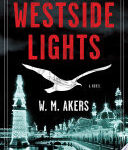I received this book for free from in exchange for an honest review. This does not affect my opinion of the book or the content of my review.
 Reluctant Immortals on August 23, 2022
Reluctant Immortals on August 23, 2022 
For fans of Mexican Gothic, from three-time Bram Stoker Award–winning author Gwendolyn Kiste comes a novel inspired by the untold stories of forgotten women in classic literature—from Lucy Westnera, a victim of Stoker’s Dracula, and Bertha Mason, Mr. Rochester’s attic-bound wife in Charlotte Brontë’s Jane Eyre—as they band together to combat the toxic men bent on destroying their lives, set against the backdrop of the Summer of Love, Haight-Ashbury, 1967.
Reluctant Immortals is a historical horror novel that looks at two men of classic literature, Dracula and Mr. Rochester, and the two women who survived them, Bertha and Lucy, who are now undead immortals residing in Los Angeles in 1967 when Dracula and Rochester make a shocking return in the Haight-Ashbury district of San Francisco.
Combining elements of historical and gothic fiction with a modern perspective, in a tale of love and betrayal and coercion, Reluctant Immortals is the lyrical and harrowing journey of two women from classic literature as they bravely claim their own destiny in a man’s world.
I don’t think that this book was for me. For me, it lacked the depth that I was expecting. Possibly because, while I’ve read Dracula, I’ve never read Jane Eyre. I’m sure there’s nuance I’m missing, and as always your mileage may very. I didn’t enjoy this.
Most of the book was a repetition of how horrible these literary villains were to the women in their lives, without the women’s perspective that I was expecting. I’m not one to revel in the retelling of trauma, but this book holds the women’s emotions like an oil slick on the surface of the San Francisco Bay. I could tell that there were worlds beneath, but frustratingly, this book gave no more insight into what happened to these women than the original books do.
I wanted to hear the story from their perspectives. This book isn’t that. It also isn’t about Lucy and Bee being empowered to confront and defeat their abusers. They do that, eventually, but the confrontation is played off as their absolute last resort. They simply don’t have the resources to run anymore, and therefore defeating their villains is the only alternative. They are more exhausted than angry, ground down by their long history with no real desire to fight back. This doesn’t play as a satisfying story.
The ending is hopeful, at least, after pages and pages of despair. Yes, this is a gothic tale. I guess I should have expected it to be flat and empty and gray. I find that sort of story unsatisfying.
I’m also disturbed by the underlying narrative of the book: that men are evil or useless or simple plot devices. It wasn’t a good look when men were doing this to women in their novels, and it’s not great here, either. Rochester and Dracula are villains through and through. Abusers with no redeeming qualities at all. That part is to be expected. But the other men in the story aren’t great either. Michael, the sweet ex-soldier just returned from Vietnam who becomes Lucy’s thrall barely has a backstory. His uncle, who owns a decrepit and failing drive-in movie theater, is one-dimensional. All we know about him is just what I’ve said.
The only other man in the book is Renfield, the original, and his narrative in the book seems to say that men will betray you 99% of the time, and can only be persuaded against that through the careful application of feminine compassion. I honestly found it kind of gross, and the sort of feminism that champions women not by elevating them, but by stomping down the men in their way.
I don’t know that this is what the author meant. Maybe I’m reading too much into it, but taking the story by itself in isolation of what the author actually meant, it says things that I don’t agree with at all. That women are pure and innocent until corrupted by men, who betray and abuse as a matter of course. Maybe the author just meant these women, and those men, or maybe she didn’t mean that at all. But I found it disturbing, and the book flat and bland. It definitely wasn’t meant for me.

